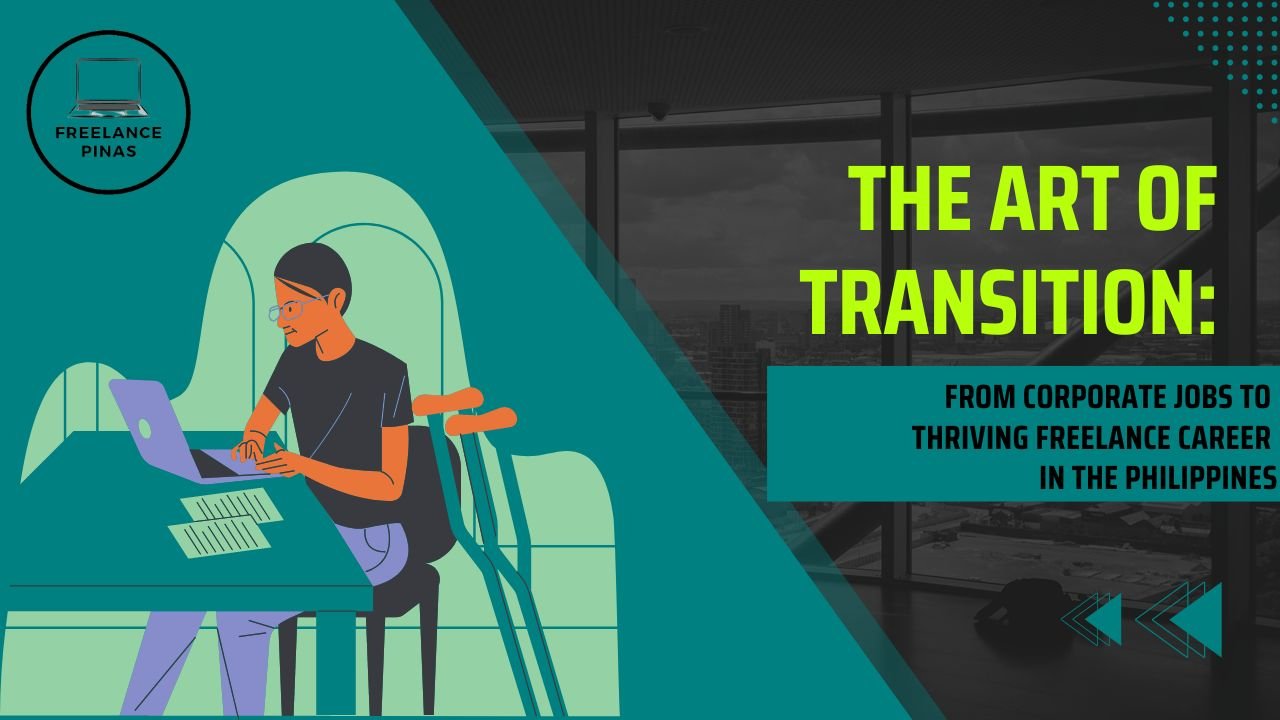In today’s dynamic job landscape, professionals in the Philippines are increasingly exploring alternative career paths that offer flexibility, autonomy, and creative freedom. Transitioning from a traditional corporate job to a thriving freelance career has become a popular choice for those seeking greater work-life balance and the opportunity to pursue their passions on their terms.
Understanding the Why: Motivations for Transitioning
The decision to transition from a corporate job to freelancing is driven by various motivations. Some of the key reasons include:
Seeking Work-Life Balance and Flexibility
The demanding nature of corporate jobs often leaves professionals craving a better work-life balance. Freelancing allows individuals to set their own schedules, enabling them to allocate time for personal pursuits while still meeting professional commitments.
Pursuing Passions and Interests
Freelancing offers the opportunity to pursue passions and interests, whether it’s creative writing, graphic design, consulting, or any specialized skill. It allows professionals to do what they love and monetize their expertise.
Escaping the Commute and Office Environment
The daily commute and rigid office environment can be draining for many individuals. Transitioning to freelancing offers the freedom to work from the comfort of home or any location, reducing stress and increasing productivity.
Diversifying Income Streams
Freelancing provides the chance to work on multiple projects and collaborate with various clients, leading to diverse income streams. This diversification can be a safeguard during economic downturns.
Embracing Entrepreneurial Spirit
Many professionals yearn for entrepreneurial freedom and the ability to control their destiny. Freelancing enables individuals to build their own brand, scale their business, and make decisions independently.
Mastering the Mindset: Overcoming Challenges
Transitioning to a freelance career comes with its share of challenges, and it’s essential to cultivate the right mindset to overcome them. Here are some key aspects to consider:
Embrace Uncertainty and Adaptability
Freelancing involves navigating uncertain income flows and client demands. Cultivating adaptability and a positive mindset can help overcome hurdles and thrive in the face of change.
Emphasize Continuous Learning
To remain competitive in the freelance market, prioritize continuous learning and skill development. Staying up-to-date with industry trends and acquiring new knowledge enhances expertise and credibility.
Building Resilience
Freelancing may involve facing rejection and uncertainty. Building resilience is crucial in handling setbacks and bouncing back stronger.
The Pursuit of Independence: Structuring Your Freelance Career
A successful freelance career requires careful planning and organization. Here are key steps to structure your freelance journey:
Identify Your Niche and Target Audience
Define your niche and target audience based on your skills, interests, and experience. Specialization helps you stand out in a crowded market and attracts clients seeking specific expertise.
Create an Impressive Portfolio
Develop a comprehensive portfolio showcasing your best work and past projects. A visually appealing and well-organized portfolio demonstrates your capabilities to potential clients.
Set Competitive Pricing
Determine your pricing strategy, considering factors like your skill level, market demand, and competition. Balance competitive pricing with fair compensation for your services.
Establish Strong Online Presence
Build a professional website and create profiles on relevant freelance platforms and social media. A robust online presence enhances visibility and credibility.
Continuous Growth: Invest in Yourself
To stay competitive in the freelance industry, continuous growth and self-improvement are essential. Here are some ways to invest in your professional development:
Attend Workshops and Webinars
Participate in workshops, webinars, and online courses to enhance your skills and knowledge. These resources provide valuable insights and keep you updated on industry trends.
Join Professional Associations
Joining relevant professional associations can provide networking opportunities, access to industry events, and resources to elevate your freelance career.
Seek Mentorship
Find mentors who have excelled in your niche or industry. Learning from their experiences can accelerate your growth and provide valuable guidance.
Read and Research
Stay informed by reading books, articles, and publications related to your field. Continuous learning allows you to expand your expertise and offer valuable insights to clients.
The Thriving Freelancer: A Journey of Fulfillment
Transitioning from a corporate job to a thriving freelance career requires courage, adaptability, and perseverance. Embrace the challenges, celebrate the successes, and view each experience as an opportunity for growth.
As a freelancer, you have the power to shape your destiny, pursue your passions, and build a career that aligns with your values and aspirations. Utilize the strategies discussed in this article to showcase your unique skills, market yourself effectively, and cultivate long-lasting client relationships.
Remember that the path to a thriving freelance career is not linear, and it requires dedication and continuous effort. Be patient with yourself and stay committed to your goals. With determination and a focus on excellence, you can truly excel in the art of transitioning from a corporate job to a flourishing freelance career.
Embrace your journey with confidence, creativity, and a willingness to learn. By doing so, you will undoubtedly leave a mark in the competitive freelance landscape and pave the way for an exceptional and fulfilling professional life. Your dedication to providing top-notch services will not only benefit your clients but also leave a lasting impact on your own sense of accomplishment and growth.
